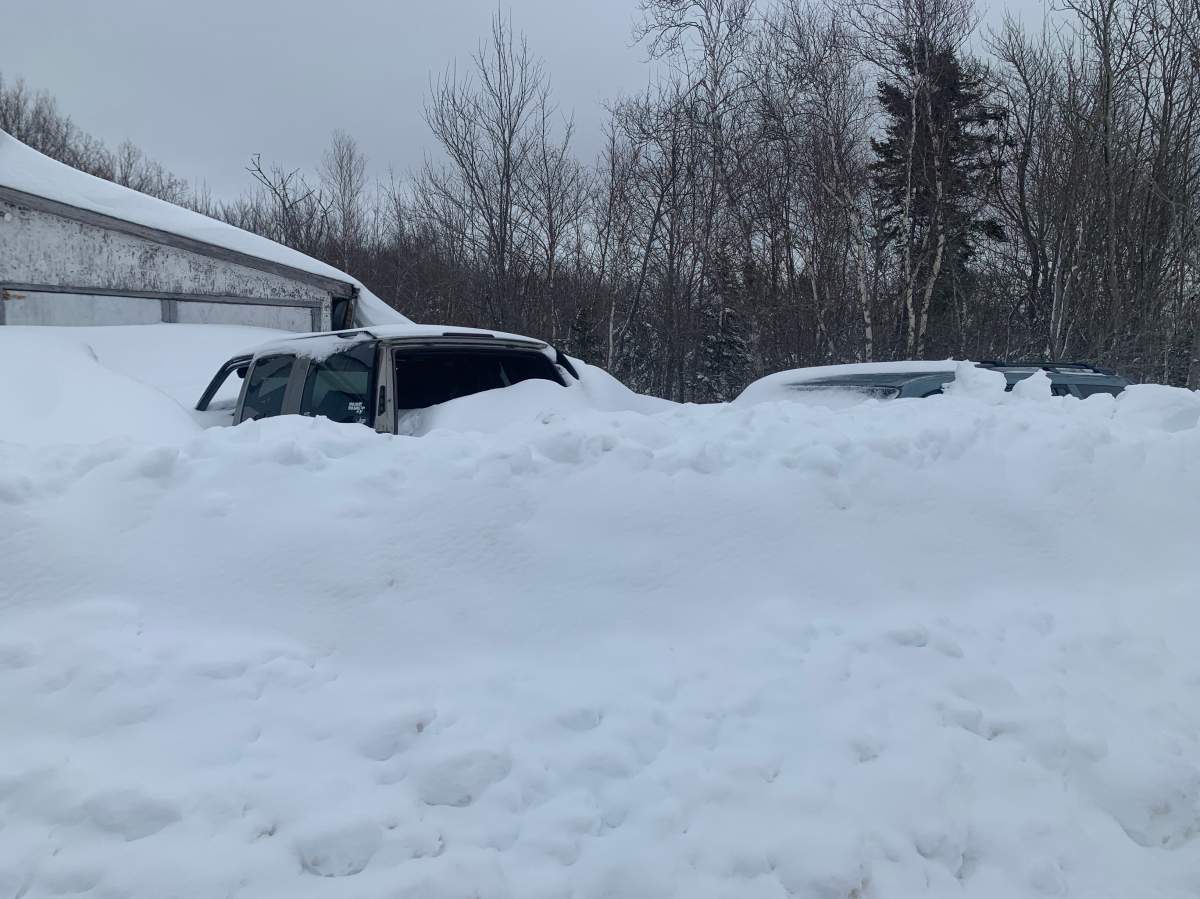A senior politician in Nova Scotia’s rural Pictou County said Thursday his municipality was still struggling to clear last weekend’s massive snowfall, partly because the area had been overlooked by the provincial government.

“That’s been a concern in this county for a while,” said Robert Parker, the county’s warden. “We were hit pretty darn hard with this one, yet all the attention is on Cape Breton.”
Cape Breton, to the east of Pictou, received as much as 150 centimetres of snow, and it has been the focus of provincial and federal relief efforts. But Parker said reports from Pictou County indicating 60 to 70 cm of snowfall last weekend drastically understated how much snow actually piled up.
“It started on Friday afternoon and it kept on coming all weekend and right into Monday,” Parker said, arguing that the area was actually buried under 90 cm to a metre of snow amid higher drifts. “We may not be as bad as some other places, but we’re in bad shape, though improving.”
The warden said the province’s snowplowing efforts were poor earlier in the week, but have since improved, helped by the arrival of big snow-clearing machines from New Brunswick.
Still, 29 of the county’s roads remained blocked as of Wednesday night. And almost all of the county’s roads are maintained by the provincial government.
Premier Tim Houston’s Progressive Conservative government should start buying bigger equipment to handle future “super storms,” Parker said. “The trucks aren’t built heavy enough and there’s not enough of them.”
Houston stressed Thursday that the province managed to clear 200 roads on Wednesday, even though it has been dealing with a record-breaking amount of snow in some areas. Another 50 roads, however, were still impassable by Thursday.

Get daily National news
“We will have a discussion to see if there is something we can do differently,” he said after a cabinet meeting in Halifax.
Public Works Minister Kim Masland said five per cent of the provinces’ snow-clearing equipment had broken down in the past few days. “I do not think that is a very high amount considering the weight of the snow that we were dealing with,” she said.
Her department confirmed Thursday it had moved 113 pieces of equipment, some of it from private contractors, to the province’s northern and eastern districts.
Meanwhile, Parker said Pictou County welcomed the arrival Wednesday of 10 snowmobiles donated by the province. Each machine came with two people from Team Rubicon Canada, a non-profit that helps communities recover from disasters and humanitarian crises. The snowmobiles will be used to reach vulnerable people who haven’t been able to leave their homes.
“I talked to a lady this morning (and) the snow is hanging off her roof, down onto her doorstep,” the warden said. “She can’t get out of her house. Just imagine if we had a fire.”
Mona Teed, a spokeswoman for the Victorian Order of Nurses, said nurses and continuing care assistants with the non-profit agency are maintaining telephone contact on at least a daily basis with their clients.
Since the weekend, Teed said the organization has recorded a steep drop in the number of clients who reported being trapped in their homes.
“Staff are trying their very best to get out to whomever they can,” said Teed, director of home and community care for Pictou and Cumberland counties. “More and more people are getting access.”
However, she said, roads in the more remote corners of Pictou County remain rough, snow-covered and icy.
“Some roads have not even had one lane made open yet — completely snowed in with no access … to get out to a main road,” she said. “There are still people who can’t leave their homes and we can’t get into their homes.”
Parker said he’s been told the roads will be cleared by Friday, but he’s not convinced that will happen.
“In the meantime, we have to do everything we can to make sure we don’t run into a disaster or lose somebody because they couldn’t get what they needed.”
The provincial government has said more than 1,000 people are on the job using about 400 pieces of equipment to clear snow across Nova Scotia.
Meanwhile, the province’s Opposition Liberal party is calling on Houston to offer financial relief to residents in Cape Breton and northeastern Nova Scotia. Liberal Leader Zack Churchill says that after post-tropical storm Fiona caused widespread damage in September 2022, the government announced a support package to help residents clear their properties and recover from the financial stress.
“The premier hasn’t taken this storm seriously, and the result has left thousands of Nova Scotians without the support they need to get by,” Churchill said in a statement.
“We’ve heard of seniors trapped in their homes and people unable to get cancer and dialysis treatment. The very least this government can do is to treat this storm with the same urgency they did (post-tropical storm) Fiona.”
This report by The Canadian Press was first published Feb. 8, 2024.








Comments